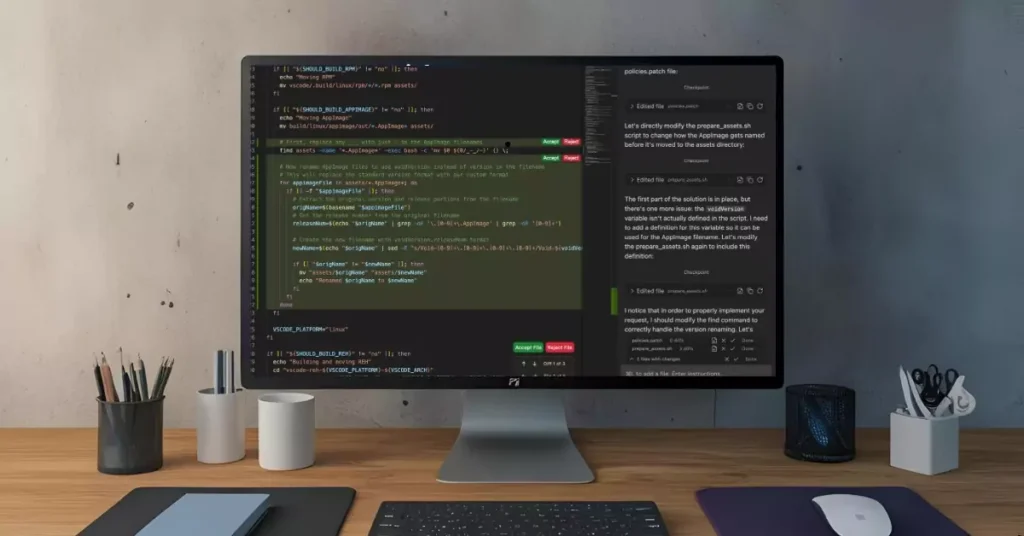Introduction: Why Void AI Matters
Have you ever felt stuck with a tool that limits your control or compromise your data? I went there and wondered if there is a better way to exploit AI without giving up privacy. This is the place where Void AI comes to a game switch for developers like us. It is an open-source AI code editor that is not only about writing code, but also about doing so on your terms. Come, it makes Void AI special, diving into it, why it’s worth your time, and how it can fit into your coding life.

What is Void AI?
So, what exactly is Void AI? This picture: A code editor that feels like Visual Studio Code (because it’s a fork), but supercharged with AI features. Unlike tools such as Cursor or GitHub Copilot, Void AI does not store your code or prompts. This allows you to connect directly to any LLM provider -like Gemini, Claude, or open-source models like DeepSeek or even host them on local hosts. Why is this thing? Because this means that you do not lock in other people’s ecosystem, and your data stays wherever you want with you.
I first heard about Void AI through a post on Hacker News, where the developers buzzed about their privacy-first approach. It is created by a community of coders who want to democratize AI-assisted coding, and it is still in beta, which means you can jump into it and even shape the future. How cool is it?
Key Features of Void AI
Let’s break down what Void AI brings to the table. What features would you want in an AI code editor? Here’s what Void offers:
- AI-Powered Coding Assistance: Think real-time autocomplete, inline editing, and the ability to ask questions about your entire codebase. It’s like having a coding partner who’s always ready to help.
- Complete Privacy: Your code and prompts never leave your control. Void doesn’t store anything, and you can host models locally for maximum security.
- Flexible Model Integration: Use any LLM, from commercial ones like Claude 3.7 to open-source options like Qwen. Host them locally to avoid API costs.
- VS Code Compatibility: Already love VS Code? Transfer your themes, keybinds, and settings in one click. It’s familiar but better.
- Community-Driven: As an open-source project, Void grows with input from developers like you. Join the Discord community to contribute or learn.
What do you think about these features? Which one would make the biggest difference in your daily coding?

How Does Void AI Compare to Other Tools?
Ever wondered how your current code editor stacks up against alternatives? Let’s compare Void AI to popular tools like Cursor, Windsurf, and GitHub Copilot:
| Feature | Void AI | Cursor | GitHub Copilot |
|---|---|---|---|
| Open-Source | Yes | No | No |
| Data Privacy | Full control, no data retention | Some data sent to private backends | Data may be stored |
| Model Flexibility | Use any LLM, local hosting supported | Limited to specific models | Limited to OpenAI models |
| Cost | Free, with optional API costs for LLMs | Subscription-based | Subscription-based ($10-$20/month) |
| VS Code Integration | Fork of VS Code, seamless transfer | Custom interface | Plugin for VS Code |
What stands out here? For me, it’s Void’s privacy and flexibility. If you are worried that your code is being used to train other people’s AI, the Void’s approach may feel like fresh air. But what else is important to you – cost, ease of use or something else?
Benefits of Using Void AI
Why should you consider switching to Void AI? Let’s look at the perks:
- Save Money: Hosting models locally means no API credit limits. You could use free open-source models and keep costs at $0.
- Protect Your Data: No middleman means your code stays private. This is huge for sensitive projects.
- Choose Your Tools: Pick any LLM that suits your needs. Want to try the latest Claude model or stick with Llama? Void’s got you covered.
- Feel at Home: If you’re a VS Code user, the transition is effortless. You’re not learning a new tool—you’re upgrading your current one.
- Join a Movement: Void’s open-source nature means you’re part of a community shaping the future of coding. Check out their GitHub to see what’s cooking.
Which of these benefits would make the biggest impact on your work? Are there any dealbreakers you’re worried about?
How to Get Started with Void AI
Ready to give Void AI a spin? Here’s how you can jump in:
- Download the Beta: Visit Void’s website to sign up for the waitlist or grab the beta release.
- Build from Source: Feeling hands-on? Pull the code from Void’s GitHub and build it yourself.
- Set Up Your Models: Connect to an LLM provider or host a model locally. Check out guides like Venice AI’s tutorial for private setups.
- Customize It: Import your VS Code settings and start coding. Explore features like Agent Mode for advanced AI assistance.
What’s stopping you from trying it? If you’re new to AI-assisted coding, the Void Discord is a great place to ask questions and get tips from other developers.
FAQs: Your Questions Answered
Let’s tackle some common questions about Void AI. What’s on your mind?
Q: Is Void AI free to use?
A: Yes, it’s open-source and free. If you use commercial LLMs, you might face API costs, but local hosting is a cost-free option. What’s your budget for coding tools?
Q: Can I use my own AI models?
A: Definitely! Void supports local hosting of any open-source model or custom ones you’ve built. What models are you thinking of using?
Q: How does Void ensure data privacy?
A: It skips the middleman, letting you connect directly to LLM providers or host locally. No data is stored. How important is privacy in your projects?
Q: Will it work with my VS Code setup?
A: Since it’s a VS Code fork, you can transfer your settings seamlessly. What’s your favourite VS Code feature you’d want to keep?
Q: Where can I get support?
A: The Void Discord hosts weekly meetings, and the GitHub repo has detailed docs. Where would you go first for help?
Wrapping Up: Is Void AI Right for You?
So, what do you think about Void AI? This is not just a tool – it’s a way to code smart while keeping control. Whether you are a single developer or part of a team, Void’s privacy, flexibility, and community-driven approaches are worth finding. It is still in beta, so there may be some rough edges, but there is a chance to shape your future.
Why not download it today from Void’s website or join the Discord community to see what others are saying? What’s the one feature you’d love to try first?
Bonus: Free Tools to Boost Your Coding
Here are some free resources to complement Void AI:
- Venice API: Set up private, uncensored AI coding with Void.
- OpenAlternative: Discover more open-source tools like Void.
- AI Tools Directory: Explore other AI coding tools.
For more developer tips and AI trends, check out daytalk.in.

